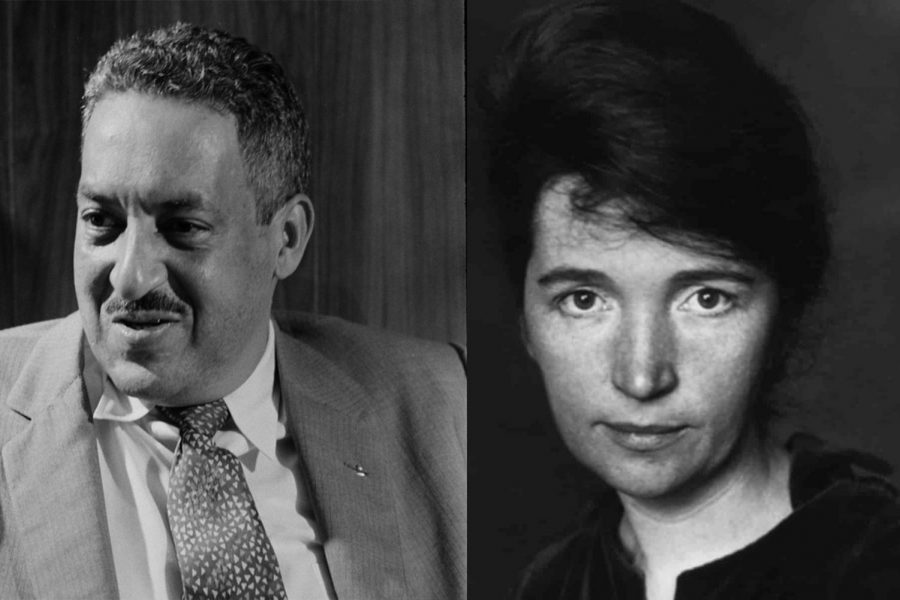A Circle in Motion
How events from the past in September and October have influenced the present
Courtesy of Flickr.com and snl.no
Thurgood Marshall (pictured left) made history as the first African American U.S. Supreme Court Associate Justice. During his time in the court, he played a part in many cases that included topics like civil rights, the death penalty, and other controversial or important issues. Margaret Sanger (pictured right) was a women’s reproductive health activist who advocated for the use of contraceptives and family planning to help women control the size of their families. She opened the first birth control clinic in the United States and created the organization now known as Planned Parenthood.
Perhaps one of the most beautiful things about history is its ability to connect itself to present day events. It could be said that the saying “history repeats itself” has never been as relevant as it is today. From issues with gender inequality and rights to politics, the past has more or less linked itself to the world we live in now.
Sept. 20, 1973
On Sept. 20, 1973, female tennis player Billie Jean King took on self-proclaimed male chauvinist Bobby Riggs in what was to be known as the “Battle of the Sexes”. This media-televised event was prompted after Riggs made comments about how women were inferior to men and could never play tennis as well as them. The event was seen by 30,000 spectators at the Houston Astrodome and over 50 million at home. Even though King won, proving women’s sports deserve the same level of respect and support as men’s, modern women’s sports still have yet to earn the same recognition as men’s. In the past year, the US Women’s National Soccer Team (USWNT) filed a lawsuit against USSF for discrimination including unfair pay. In the courtroom, USSF president Carlos Codeiro used language implying that the women’s team did not perform in an equal amount of skill to the men’s team, thus deserving less payment. Comparing the wins between both teams, this is false and after lots of backlash from fans Codeiro resigned. As of now, however, the courts have rules against the USWNT.
Oct. 2, 1967
On Oct. 2, 1967, Thurgood Marshall was sworn into the U.S. Supreme Court as the first African American associate justice. Prior to his appointment, he fought against racism as a lawyer for the NAACP in cases like Sweatt v. Painter (1950) and Brown v. Board of Education (1954). During his time as a Supreme Court justice, he was part of revolutionary cases such as Furman v. Georgia (1972) where he argued against the death penalty and Roe v. Wade (1973) which discussed the matter of abortion. Today, many of these matters are still being heavily debated. In recent months there has been a lot of talk about racial injustices and the possibility of Roe v. Wade being overturned, not to mention the constant debate over wether or not the death penalty is humane.
Oct. 5, 1877
On Oct. 5, 1877, Chief Joseph of the Nez Perce Native Americans finally surrendered to the U.S. Army after months of attempting retreating north with his tribe. This was the result of the U.S. government ordering his tribe out of their homeland in Oregon once an influx of white settlers began moving there. During this time, members of fellow leader White Bird’s band of Nez Perce people killed some white settlers so Chief Joseph deemed it necessary to retreat to avoid defeat. The group traveled about 1,700 miles to the Bear Paw Mountains of Montana and suffered many deaths before Chief Joseph surrendered. Unfortunately, the Nez Perce tribe was not allowed back to their homeland but instead was placed onto a reservation in Kansas. Even today some of the Indigenous people of North America still live on these reservations where they are treated with a lack of government funding in schools and underfunded healthcare which leads to an overall lower life expectancy. Besides those problems, the Native American community has continuously faced violence and discrimination. To this day, they are still working with the U.S. government to preserve their culture while having equality with other Americans.
Oct. 8, 1871
On Oct. 8, 1871, chaos erupted after a fire started in or near the barn of Patrick and Catherine O’Leary. Legend states it started because the O’Leary’s cow kicked a lantern over in the barn, but that has never been proven. The fire burned until October 10 and killed about 300 people, caused around $200 million in damages, and burned more than 17,000 buildings. In early September of 2020, wildfires suddenly started in California after a smoke-generating device that was going to be used for a gender-reveal party, malfunctioned. The fires burned through most of the state, destroying thousands of homes and displacing families. Like in 1871, the dry climate contributed to the rapid spread of the fire. However, this time there is a new threat: climate change. With little government response, environmental activists worry that this may be just the beginning of climate change’s effects on the earth.
Oct. 8, 1998
The date Oct. 8, 1998, represents the day the U.S. House of Representatives reached the decision to impeach President Bill Clinton on account of lying under oath to the federal grand jury and obstructing justice. A former intern at the White House named Monica Lewinsky reportedly had an affair with President Clinton, who had denied all allegations against him. At the time, Clinton was already being tried for sexual harassment by another woman and Lewinsky’s story eventually became part of that report. Clinton was eventually caught lying through recorded tapes and witness evidence. He was the third president to ever be impeached. This year, President Donald Trump was also impeached for abuse of power and obstructing Congress. The impeachment came after he reportedly tried to get information on his then potential opponent for the 2020 presidency, Joe Biden, from Ukraine by withholding military aid. Many democrats celebrated at the time as it was a chance to get Trump out of office, but the Senate decided in the end that Trump needed to stay in office, much like the outcome of Clinton’s case.
Oct. 16, 1916
Oct. 16, 1916 marked the opening of the first birth control clinic in the U.S. in New York by female reproductive rights activist, Margaret Sanger. Just a week after the clinic opened, Sanger was arrested and spent 30 days in jail before appealing her conviction. Though her case lost, the courts did decide that physicians were able to prescribe birth control for medical reasons only. However, there was a loophole which allowed Sanger to open another female staffed clinic in 1923 which eventually became the organization known as Planned Parenthood. Through this, Sanger’s legacy lives on, but female reproductive rights are still being heavily fought for because of constant regulations placed by the government. Recent government regulations such as more restrictions on Title X, Heartbeat Bills, and stricter laws on abortion have restricted women’s reproductive health. The problem is that women’s health clinics provide other health services like STD testing, birth control, and cancer screenings too. After the death of supreme court justice, Ruth Bader Ginsburg, many women have expressed fear over the possibility of Roe v. Wade being overturned which would make abortion illegal and possibly outlaw these clinics entirely.
Oct. 20, 1973
On Oct. 20, 1973 the “Saturday Night Massacre” occurred when President Richard Nixon fired Special Prosecutor Archibald Cox and accepted the resignations of Deputy Attorney General William Ruckelshaus and Attorney General Elliot Richardson following the Watergate Scandal. Nixon ordered Ruckelshaus and Richardson to fire Cox after he rejected Nixon’s refusal to release the secret tapes from the Oval Office. After this night, 21 members of Congress made resolutions for Nixon’s impeachment. Comparatively, during President Trump’s term he has been accused of using Russia to rig the 2016 Presidential Election and for using funding against Ukraine to get information from them about fellow Presidential Candidate Joe Biden. In early 2020, he was impeached on charges related to the latter after a lot of outcry from American citizens.
Oct. 28, 1886
Oct. 28, 1886 highlighted the dedication of one of the most iconic landmarks in America: the Statue of Liberty. The statue was a gift to the U.S. from France to memorialize the alliance between the two countries during the Revolutionary War. As time has gone on, it has become the symbol of freedom to many immigrants who came to the country through nearby Ellis Island. Many Americans descended from these individuals; however, immigration is still a heavily debated subject. In recent years, issues like the ICE detention camps and the attack on Dreamers have targeted immigrants (mainly from Mexico) causing a lot of outrage from many second and third generation Americans and other angry citizens. In turn, these citizens have expressed their concerns through social media and protests.
Sources: history.com, biography.com, espn.com, bbc.com, naacpldf.org, wikipedia.org, washingtonpost.com, womenshistory.org, mom.com, and apps.lib.umich.edu
Your donation will support the student journalists of Francis Howell Central High School. Your contribution will allow us to purchase equipment and cover our annual website hosting costs. FHCToday.com and our subsequent publications are dedicated to the students by the students. We hope you consider donating to allow us to continue our mission of a connected and well-informed student body.











